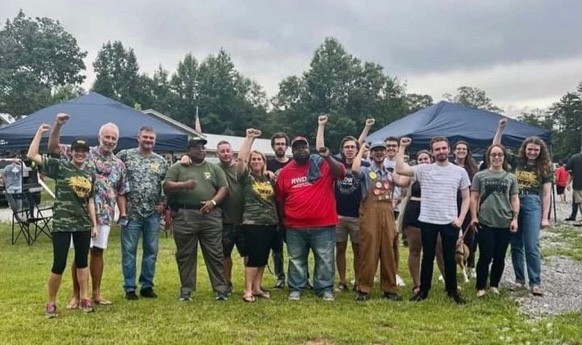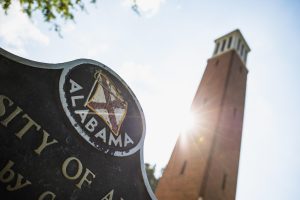Students should pay attention to Alabama’s record coal mine strikes
September 11, 2022
The term “redneck” is a common identifier in the South to describe someone as dirty, classless or dumb. While it is often used jokingly or in a derogatory manner, the label stems from hard labor and can be a rallying point for Southerners.
The term has a radical history. The coal wars of West Virginia were a brutal conflict between striking miners and coal mine operators in the early 20th century over the low wages, unsafe conditions, poor living spaces and the right to unionize.
Originally, the word “red” was used to insult the striking miners by insinuating they were communists and foreign agents. However, the coal miners took it as a badge of honor and began wearing red bandanas as a sign of solidarity.
They used this insult as a common ground for their movement and turned being a “redneck” into a thing of pride. And the South’s fight for workers’ rights didn’t stop there.
This battle is unfolding again in Alabama. Over 1,000 coal miners in southwest Birmingham have been on strike against Warrior Met Coal since April 1, 2021, marking 528 days of protests.
The brewing of the walkout actually started several years ago when the United Mine Workers of America said the owners of Warrior Met refused to negotiate while charges of unfair labor practices began to pile up in the early stages.
In 2016, miners took a pay cut of $6 per hour and reduction in health insurance and retirement benefits to keep the company afloat during bankruptcy. Warrior Met Coal was said to have offered a $1.50 increase in wages from 2021-2026, a slap in the face compared to what miners had sacrificed.
This past August, Joe Biden’s National Labor Relations Board ordered the union to pay 13.3 million dollars directly to Warrior Met Coal. The board states the charges are for increased labor, lost revenue with unmined coal, increased security throughout the strike and “damages.”
While the miner’s union could barely afford to give the strikers $18,000 a year, Biden’s labor board requires they pay compensation to a company that generated over $1 billion from cutting pay and benefits since 2016.
The labor board’s charges against the union are so excessive that they effectively punish the union for lasting this long. Cecil Roberts, the international union president of the United Mine Workers of America, stated, “This is outrageous and effectively negates workers’ right to strike. It cannot stand.”
The lack of support for the union from mainstream Republicans and Democrats is shocking to say the least. Working class Americans deserve an explanation as to why these coal miners are being punished so severely. And the answer Biden’s board gives us is unsatisfactory.
The National Labor Relations Board was established in 1935 to mediate conflicts between companies and unions. Coupled with Biden’s claim that he will “establish a federal right to union organizing and collective bargaining for all public sector employees,” the decision to punish the unions for doing that exact thing is blatant hypocrisy.
The 13.3 million dollars was decided upon by the board after the union agreed to pay a portion of the monetary damages as a cautionary measure, not knowing that the board would charge them exponentially more than they agreed to. In the midst of the controversy, many are wondering why congressional Democrats aren’t speaking out. Democrats have offered nothing but indifference to the union, leaving the striking workers essentially abandoned.
Clearly, the discourse around worker’s rights in Alabama has been intensifying. As members of the next generation of workers, students at the University should strive to know their rights. If the coal strikes at Warrior Met have shown us anything, it is that solidarity and active knowledge of our rights will be crucial in upcoming years in the workforce.
Gallup found that 71% of Americans currently support labor unions, reaching favorability that has not been seen since 1965. Unions are sweeping through massive companies such as Amazon, Starbucks and Chipotle as individuals recognize the growing benefits of unionization.
The Economic Policy Institute states that union workers receive up to an 11% higher compensation than non-union counterparts on average. They also pay lower health care deductibles for personal and family coverage and receive higher benefits than non-union employees.
Students at the University have everything to gain from learning how unionizing helps them and how to uphold their rights as the next wave of working Americans. With Congress proving they aren’t willing to speak out for workers, it is a necessity that students take up the knowledge that will help them maneuver worker’s rights conflicts.
There are several resources through which students can become more engaged in the fight for workers’ rights. The American Federation of Labor-Congress of International Organization outlines how to start a union, how to contact a union organizer and how unions can help individuals. You can even look at local unions’ efforts such as Bamazon, a collection of workers fighting for unionization against Amazon’s prominent anti-union tactics.
Haley Czarnek is a 2022 law school graduate at The University of Alabama and spent time in law school helping the Birmingham Democratic Socialists of America with unionization efforts across the state.
“Birmingham DSA is working hard to build solidarity with workers, and we make it a priority to support unions and workplace organizers,” Czarnek said.
Getting involved with unions can be a transformational experience for students.
“Getting to know some of the UMWA folks and our local Starbucks workers has been incredible, and UA students should absolutely join if they want to be part of the chapter’s labor work,” Czarnek said.
There are even resources on campus available to UA students. United Campus Workers of Alabama brings the issue home, providing training and opportunities to expand local workers’ rights. There is always room on campus to become involved in unionization efforts.
I was recently elected vice president of Students for Fair Labor, an organization that helps students know their rights on and off campus. We also work with students to make sure their rights are being protected. No matter the level, there are opportunities to lead the new wave of workers’ rights.
Our role in the fight for fair labor is much bigger than we think. If we take advantage of these resources now and learn what our rights are we can create a more stable future for all of us. Every student at the University should take it upon themselves to relentlessly organize and continue the radical southern tradition of unionization.





















